Today’s CometWatch entry is a single frame NAVCAM image obtained on 20 February from a distance of 118.5 km from the centre of Comet 67P/Churyumov-Gerasimenko. The image has a resolution of 10.1 m/pixel and measures 10.3 km across.
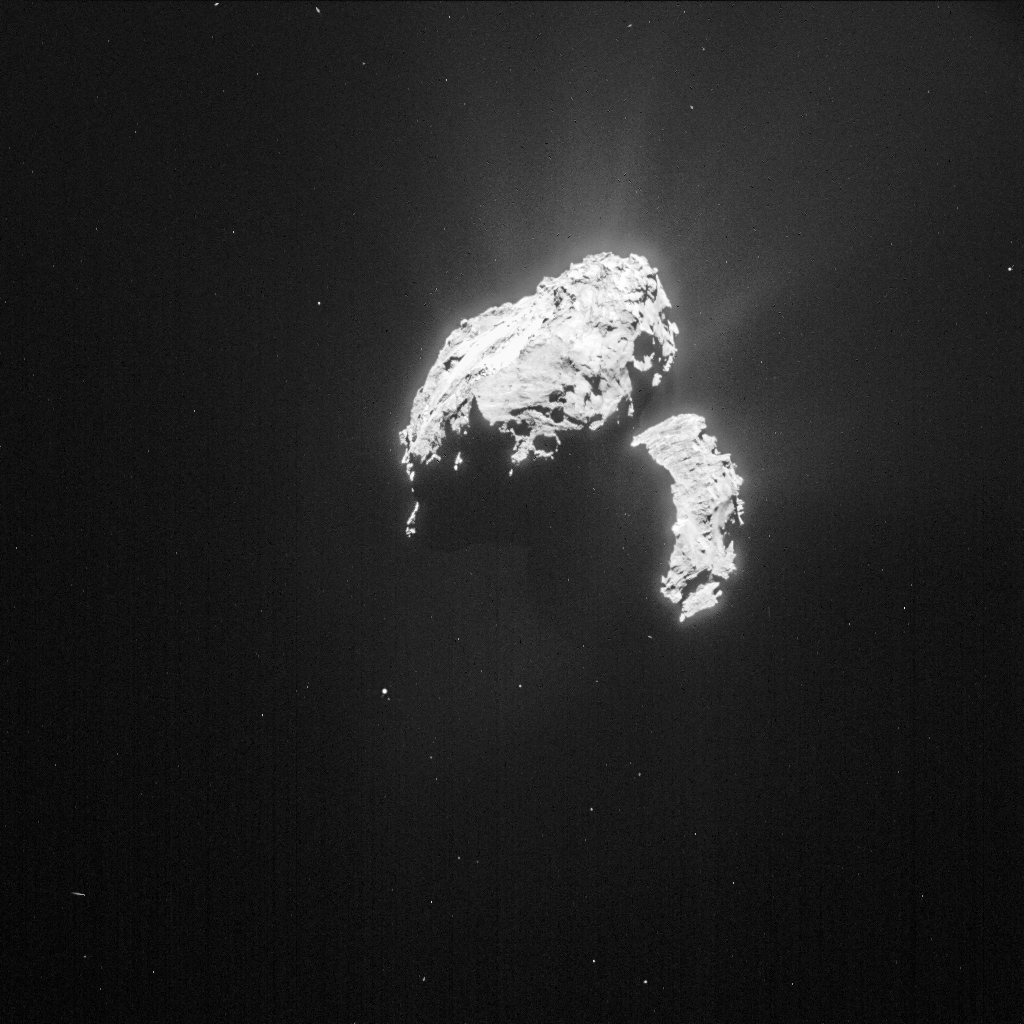
Single frame (1024 x 1024 pixel) NAVCAM image of Comet 67P/C-G taken on 20 February from a distance of 118.5 km to the comet centre. The image has been processed to bring out the details of the comet’s activity. The exposure time of the image is 3 seconds. Credits: ESA/Rosetta/NAVCAM – CC BY-SA IGO 3.0
The image nicely complements that published on Monday, this time showing the comet’s small lobe to the right and the large lobe to the left. Some 80 km closer than Monday’s image, details on the comet nucleus are now a little clearer again. For example, the smooth Imhotep region on the large lobe at the far left can be distinguished from the adjacent terrain of Ash, while on the small lobe the cliffs of Hathor stand out (refer to the regional maps here and here if you are unfamiliar with the comet’s regions).
Rather captivating is the shadow of the larger lobe that is projected onto Hathor. The silhouette of the ‘underside’ of the comet can also be seen against the diffuse nebulosity to the lower-left of the nucleus. Around the sunlit portion of the nucleus, the nebulosity of the comet’s innermost coma can be seen together with denser streaks that likely correspond to regions of greater surface activity.
As usual, background features are typically a mix of detector noise, stars, and material ejected from the comet.
The original image is provided below:

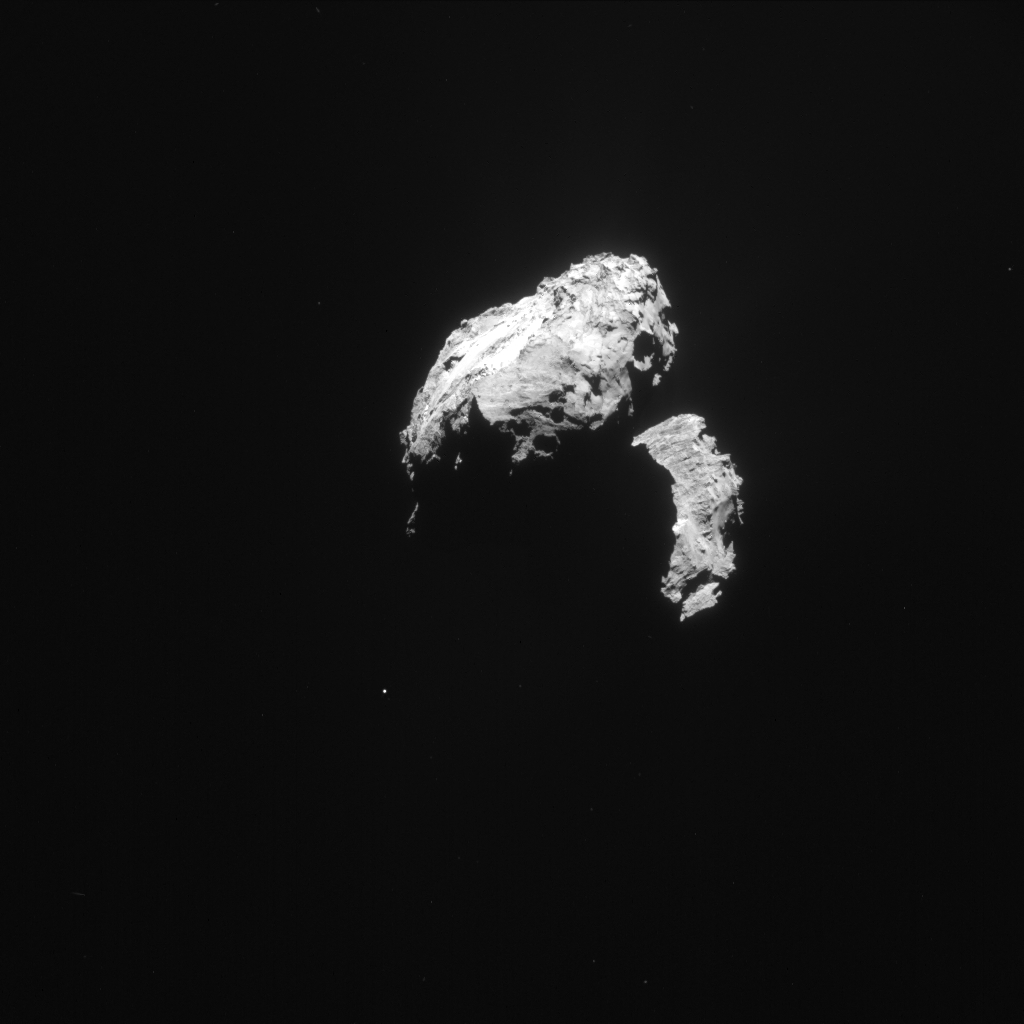
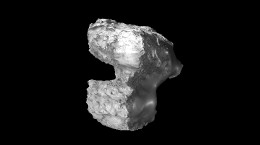
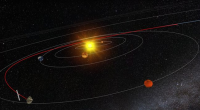
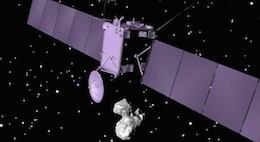


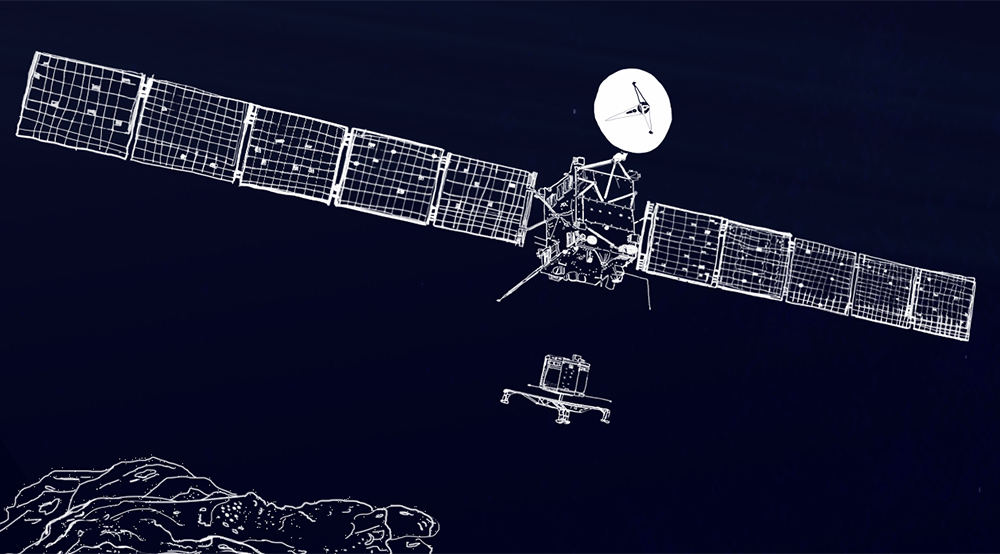
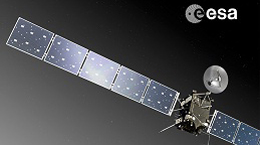
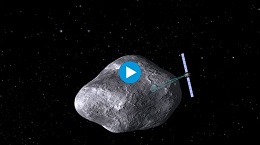
Discussion: 16 comments
Excellent work guys!!!!!! Want to know when the Philae will restart…..waiting to see its activities……please reply
THOMAS, have you seen this one:
https://www.sciencedirect.com/science/article/pii/S0019103505004628
Interesting 2005 review of previous appearances of comet 67P C-G in 82/3 and 95/6. Photometric data from Earth based observation before and after perihelion. It is all interpreted based on the ice model assumption without any acknowledgment that other interpretations could be equally appropriate. Forgetting the convolutions of the interpretation there are some interesting results. For example max activity for dust and gas evolution was 1 month after perihelion; rate of change of dust evolution did not coordinate with rate of change of gas evolution ; activity of both dust and gas varied markedly from day to day; a significant increase in activity (brightness) in data by Kidger in 2003 occurred almost 6 months after perihelion ( factor of 4 or 5). This was re analysed and explained away as non intrinsic.
Thanks, Originaljohn. This type of unexpected behaviour has since been more than confirmed since then, first by the inexplicable 6-week outburst of activity with formation of a coma way back in last March-April, only for it to just as inexplicably disappear again…(https://www.esa.int/Our_Activities/Space_Science/Rosetta/Rosetta_s_comet_expect_the_unexpected) and by the “significant” day to day variations in the composition of the coma recently reported by ROSINA : https://blogs.esa.int/rosetta/2015/01/22/comets-coma-composition-varies-significantly-over-time/.
Holger Sierks’ “expect the unexpected” is nicely matched by ROSINA investigator Dr. Stephen Fuselier’s comment: “It was certainly a surprise when we saw time variations from 200 km away. More surprising was that the composition of the coma was also varying by very large amounts. We’re taught that comets are made mostly of water ice. For this comet, the coma sometimes contains much more carbon dioxide than water vapour.” and by that of his colleague Dr. Myrtha Hässig: ““When I first saw this behavior, I thought something may have been wrong, but after triple-checking the data, we believe 67P has a complex coma-nucleus relationship, with seasonal variations possibly driven by temperature differences just below the comet surface.”
Apparently, everyone is now having to learn not to simply believe what they have “been taught” about comets…
“…the inexplicable 6-week outburst of activity with formation of a coma way back in last March-April”. Maybe 67P meets the Heliospheric current shet.
The jets are amazing.
Yet another image which clearly shows the neck region as being the focus of major jetting activity whereas it is in deep shadow and is thus deprived of any thermal input from sunlight.
Hi Thomas, are no longer very sure that the activity is in the neck.
Not in the Hapi surely, even if the prospect sometimes deceiving.
Hapi is still full of fine dust.
Rather it seems to me that the jets are from large circles on the sides of the lobes.
I seem to see that in those places the dust is disappearing and there are only the big stones.
It would be interesting, knowing the size of the stones that remain, the specific weight and the force of gravity, calculating the pressure of the jets(giving a image with good definition).
Also the central area of Imhotep have this feature.
https://domelune.com/photos/67P-PhilaeTD17.jpg
Who explains to me why the gas and dust are bent in the direction of the Sun?
It seems anomalous…
https://www.esa.int/spaceinimages/Images/2015/02/Comet_on_9_February_2015_NavCam
Hi Marcoone. Very interesting your careful observations of the plausible sources of these particular jets. To me, a full aura of jets exists at this moment. Robin has made the point before that Sun-Jets-NAVCAM have to be at very particular alignments to give them enough contrast.
Sun is behind and up from feb09 NAVCAM on this photo. Straight up if you look at the eclipsing of particles. So main cryo ‘jet’ is being deflected left and up of Ducky’s head ‘atmosphere’. Secondary and Tertiary deflected back to body. Others radial. If you have a photo tool increase contrast to max to resolve this.
Not in direction of our Sun, if you look carefully 😉
I insist ..
looking carefully I would expect that the jets were curved downward :
https://domelune.com/photos/67P-PhilaeTD18.jpg
@ marcoone
If the jets were emanating from the lobes, we would presumably also see them radiating at much wider angles all around them. In fact, we are seeing jets fanning out over around 90° only, from a central location which can only be the neck region, as in every other published picture over the past six months. What we again see all around the two lobes is a diffuse fuzz which presumably corresponds to the “sputtering” ESA has already clearly identified.
the grey font used on this site is barely readable
If it isn’t an artefact then the dust particle to the left and down of the comet sure is big and/or bright and/or close.
Agree Daniel. That very strong Philae’s 1st rebooting brought up a worries tail. So, not discarding Hard-Cells/High-Pressure/High-Speed-Fragments.